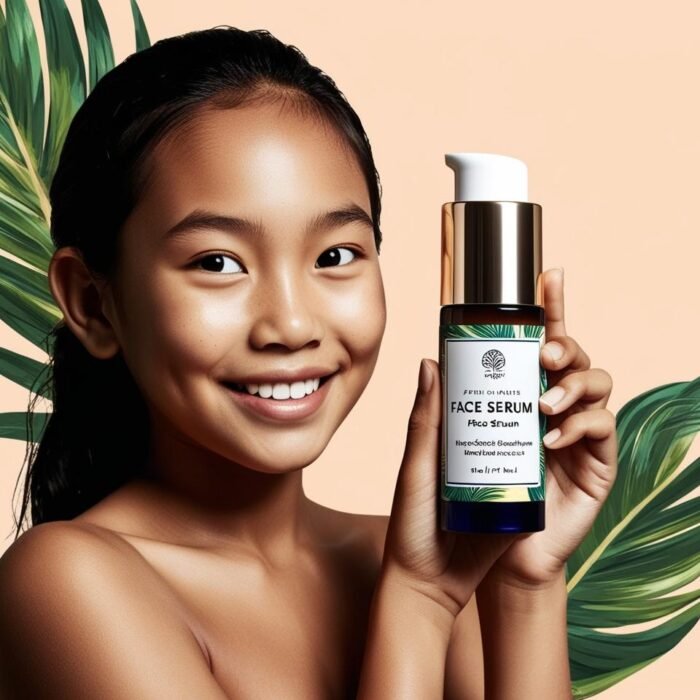Face Serum
A face serum is a lightweight skincare formulation designed to deliver potent active ingredients directly into the skin. Unlike traditional moisturizers, which primarily focus on hydration and barrier protection, serums have a more targeted approach. They boast higher concentrations of active ingredients, such as vitamins, antioxidants, and peptides, allowing them to address specific skin concerns, including signs of aging, pigmentation, and uneven texture. The unique formulation of serums enables them to penetrate deeper layers of the skin, providing more effective treatment options compared to standard creams or oils.
- Estimated Delivery : Up to 4 business days
- Free Shipping & Returns : On all orders over $200
What is a face serum?
A face serum is a lightweight skincare formulation designed to deliver potent active ingredients directly into the skin. Unlike traditional moisturizers, which primarily focus on hydration and barrier protection, serums have a more targeted approach. They boast higher concentrations of active ingredients, such as vitamins, antioxidants, and peptides, allowing them to address specific skin concerns, including signs of aging, pigmentation, and uneven texture. The unique formulation of serums enables them to penetrate deeper layers of the skin, providing more effective treatment options compared to standard creams or oils.
The distinction between serums and other skincare products lies not just in their texture but also in their purpose. While moisturizers are essential for hydration—a crucial element in any skincare routine—serums are specifically designed to target particular issues. Oils, on the other hand, are typically associated with sealing in moisture and providing nourishment. Serums, with their lightweight consistency and potent ingredients, serve as a bridge between hydration and treatment, making them a valuable addition to any skincare regimen.
Incorporating a face serum into a daily routine can yield numerous benefits. By effectively addressing individual skin concerns, serums can lead to visible improvements in skin texture and tone. Their formulation often includes antioxidants that protect the skin from environmental stressors, as well as peptides that promote collagen production. As a result, the use of serums can enhance the overall efficacy of your skincare regime, delivering results that may not be achieved through moisturizers alone. Hence, understanding the role of a face serum is crucial for optimizing skincare results and achieving radiant, healthy skin.
Types of Face Serums and Their Benefits
Face serums are concentrated formulations designed to deliver active ingredients directly to the skin, providing targeted solutions for various skincare issues. The market offers a plethora of serums, each tailored to address specific skin concerns. Understanding the different types of face serums can empower consumers to make informed choices that align with their unique skincare needs.
Hydrating serums are formulated to help replenish moisture in the skin. Often enriched with hyaluronic acid, these serums attract and retain water, resulting in plumper, smoother skin. They are ideal for individuals with dry or dehydrated skin, as they help to restore the skin’s moisture barrier, leaving it feeling soft and supple.
Anti-aging serums typically contain ingredients such as retinol, peptides, and antioxidants. These components work together to reduce the appearance of fine lines and wrinkles, promote skin elasticity, and improve overall texture. For those concerned about the signs of aging, incorporating an anti-aging serum into a daily routine can yield significant results over time.
Brightening serums aim to enhance radiance and tackle uneven skin tone. Formulated with ingredients like vitamin C, niacinamide, and licorice extract, these serums help to inhibit melanin production and reduce the appearance of dark spots. Using a brightening serum can help achieve a more luminous complexion, making it a popular choice for those seeking a vibrant glow.
Acne-fighting serums are designed to target blemishes and prevent future breakouts. Typically containing salicylic acid, benzoyl peroxide, or tea tree oil, these formulations help to unclog pores, reduce inflammation, and balance oil production. Individuals with acne-prone skin may find that a dedicated acne serum helps improve their skin’s overall clarity and texture.
By exploring the benefits of these various types of face serums, individuals can better understand which formulations suit their skincare concerns, ultimately enhancing their overall regimen and skin health.
How to Choose the Right Face Serum for Your Skin Type
Choosing the right face serum is essential for tailoring your skincare regimen to effectively address your specific skin type and concerns. Understanding your skin type—whether it be oily, dry, combination, or sensitive—plays a crucial role in selecting a product that will yield the best results. To start, perform a thorough assessment of your skin. Oily skin typically appears shiny, prone to blemishes and enlarged pores, whereas dry skin may feel tight, flaky, or rough. Combination skin features varying textures and often has an oily T-zone along with dryness in other areas. Sensitive skin may present itself with redness, irritation, or reactions to certain products.
Once you have identified your skin type, consider the key ingredients that will benefit your specific needs. For oily skin, look for face serums containing salicylic acid, niacinamide, or tea tree oil, which can help regulate oil production and minimize breakouts. If you have dry skin, opt for serums rich in hyaluronic acid, glycerin, or ceramides, which provide hydration and strengthen the skin barrier. Combination skin can benefit from multi-functional serums that balance moisture and oil, such as those containing both lightweight oils and hydrating ingredients.
For sensitive skin types, it is advisable to choose serums that are fragrance-free and feature calming ingredients like aloe vera, chamomile, or calendula. Always read the ingredient labels to ensure that the serum is free from potential irritants such as alcohol and synthetic fragrances. Additionally, conducting a patch test before fully integrating a new product into your routine is recommended to gauge compatibility and avoid adverse reactions. By selecting a serum tailored to your specific skin type and concerns, you enhance your chances of achieving healthy, radiant skin.
How to Incorporate a Face Serum into Your Skincare Routine
Incorporating a face serum into your skincare routine can significantly enhance the effectiveness of your regimen. To begin, it is essential to establish a consistent cleansing routine. Start each day and evening by using a gentle cleanser appropriate for your skin type to remove makeup, dirt, and excess oils. This preparatory step is crucial as it allows the serum to penetrate the skin more effectively.
After cleansing, the next step is to apply a toner. A toner helps to balance the skin’s pH and prepares it for the next stages of skincare. Choosing a hydrating toner can further enhance the moisture level of your skin, which in turn helps the face serum to be absorbed better during application.
Once your skin is clean and toned, it is time to apply the face serum. Typically, a small amount, about a pea-sized drop, is sufficient. Gently pat the serum onto your skin using your fingertips, focusing on areas that require extra attention, such as fine lines, dark spots, or dryness. The serum should be applied before your moisturizer, as this allows the active ingredients to target specific skin concerns more effectively.
Consistency in applying the serum is vital to achieving desired results. Aim to use it both in the morning and at night, following your cleansing and toning rituals. Patience is equally important; it may take several weeks of regular use to notice significant changes in your skin’s texture and appearance. Additionally, consider pairing your serum with complementary products, such as a moisturizer containing similar active ingredients, for enhanced effectiveness. By integrating a serum into your routine with diligence and care, you can maximize its benefits and elevate your overall skincare regimen.
Common Mistakes to Avoid When Using Face Serums
Utilizing face serums can significantly enhance your skincare routine, but certain mistakes can hinder their effectiveness. One common pitfall is overuse. Many individuals assume that applying more of a serum will yield better results; however, this is not the case. Most serums are concentrated formulations, meaning a small amount—typically a few drops—is sufficient to achieve the desired effect. Excess application may lead to skin irritation or clogged pores, undermining the benefits of the product.
Layering face serums with incompatible products is another frequent error. Some ingredients can negate each other’s benefits or even cause adverse reactions. For instance, combining retinol with vitamin C or acids can result in irritation. It is crucial to understand the ingredients in your serums and how they interact with those in other products within your routine. To avoid this mistake, consider alternating the use of potent ingredients or consulting with a skincare professional for personalized advice.
Additionally, neglecting to patch-test new serums can have unfortunate consequences. Patch testing allows you to ascertain how your skin will react to a new product, providing an opportunity to avoid potential allergies or reactions. Apply a small amount of the serum on a discreet area of your skin and observe for any adverse effects over a period of 24 to 48 hours before incorporating it fully into your regimen.
Lastly, misapplication of serums can diminish their effectiveness. It is essential to apply serums on clean skin, gently pressing into the face with the palms rather than rubbing harshly. Following up with a moisturizer helps lock in the serum’s benefits, creating a protective barrier on the skin. By adhering to these guidelines, you can optimize the results of your face serums and enhance your overall skin health.
| Weight | 0.100 kg |
|---|---|
| Dimensions | 3 × 3 × 14 cm |
| size | 10ml, 30ml |










 Hair Growth
Hair Growth 














Reviews
There are no reviews yet.